- Home
- Middle East News
- About USA Weekly News
- World News
- INLNews News Headlines
- Benjamin Netanyahu Israel
- US Politics
- UK Ireland News
- Saleh al-Arour killed
- Israel Genocide ICJ Case
- Israel Mossad Hamas Cash
- INLTVNews VideosP1
- Netanyahu RothschildCrime
- Pippin Drysdale Artist
- Wayne Hastings CarewReid
- Lloyd Carew-Reid Music
- Adam Carew-Reid Business
- Hidden Tribes In the USA
- Trump Shooting Analysis
- Irish Crime Exposed
Discover the World of USA Weekly News
Gideon Levy: The Zionist Tango: Step Left, Step Right The Real News
Jewish religious leader reveals how he feels about Israeli aggression in Gaza TRT World Now
Jewish religious leader reveals how he feels about Israeli aggression in Gaza TRT World Now
Gideon Levy: The Zionist Tango: Step Left, Step Right
934K subscribers
2018 The Zionist Tango: Step Left, Step Right
https://www.wrmea.org/2018-may/the-zionist-tango-step-left-step-right.html
GIDEON LEVY 2018 MAY POSTED ON MARCH 9, 2018Washington Report on Middle East Affairs, May 2018, pp. 44-51
Gideon Levy
Grant Smith: I’m very pleased to welcome back Haaretz columnist Gideon Levy. In his column in Haaretz, he’s called for greater Israeli empathy toward the suffering of Palestinians. He’s an extremely well-known commentator because of his willingness to take on tough issues. Consequently, he’s no stranger to very intense opposition. His columns about politics, money, how Israel’s military occupation is changing Israeli society, and U.S.-Israel relationships are very widely read, reposted and discussed around the world. Who doesn’t get in their inbox a Levy column once in a while? His vocal opposition to Israel’s last major invasion and bombing of Gaza took place against an enormous backdrop of widespread support for the military operation within the Israeli public, and so he gave voice to those who were secretly against the war but cautious about voicing such opinions openly.
He was the recipient, with Palestinian pastor Mitri Raheb, of the 2015 Olof Palme Prize for their fight against the occupation and violence. He has also received the Peace Through Media Award at the 2012 International Media Awards, the Euro-Med Journalist Prize for 2008, the Leipzig Freedom Prize in 2001, the Israeli Journalists’ Union Prize in 1997, and The Association of Human Rights in Israel Award for 1996.
I would like to encourage everybody to send in your comment cards. We have a number of students and interns who are circulating and picking those up so that we can have a very wide-ranging set of questions for Gideon when he finishes.
His book, The Punishment of Gaza, was published in 2012 by Verso Publishing House in London and New York. He will be available to sign some copies of that book during the reception. But now please welcome Gideon Levy.
Gideon Levy: Thank you. Thank you, Grant. I was wondering whom you were talking about. Can I stay here and not go back home?
It’s my third time here with these wonderful people and the third time—on one hand, I feel so much at home. I know so many faces. You all get younger, I get older. You all get more energized and more devoted, and I get more and more desperate. But it puts me also on a challenge because, already on my second time here I started my speech—as far as I can recall—with a concern that I’m going to repeat myself and bore you to death, because by the end of the day I’m a singer of one song and you’ve heard it already. But the organizers were sophisticated enough this time, and they gave a very strange title to my speech which doesn’t enable me to sing my song. I have to fit to a new song, so I’ll do my best. But I’m really, really so grateful for all the wonderful people who brought me here and Catrin, my partner. This day was so interesting for us, so enriching. In Hebrew we have this expression, “We came to strengthen and we came out strengthened.” And this is what I feel after a conference like this.
Maybe you are holding the key for any kind of change, for any kind of hope, because, as I’ll try to claim later on, the hope for change within Israeli society is so limited. It’s nonexistent. When the United States is still so crucial, people like you really can make the difference. People like you can really be a game changer, and I mean it. Never before have Israel and the United States shared the same values as in these days. The only place on earth that Donald Trump is beloved, admired, adored and appreciated is Israel. The only place that Binyamin Netanyahu is admired, adored, beloved is the United States. If this is not shared values, what is shared values?
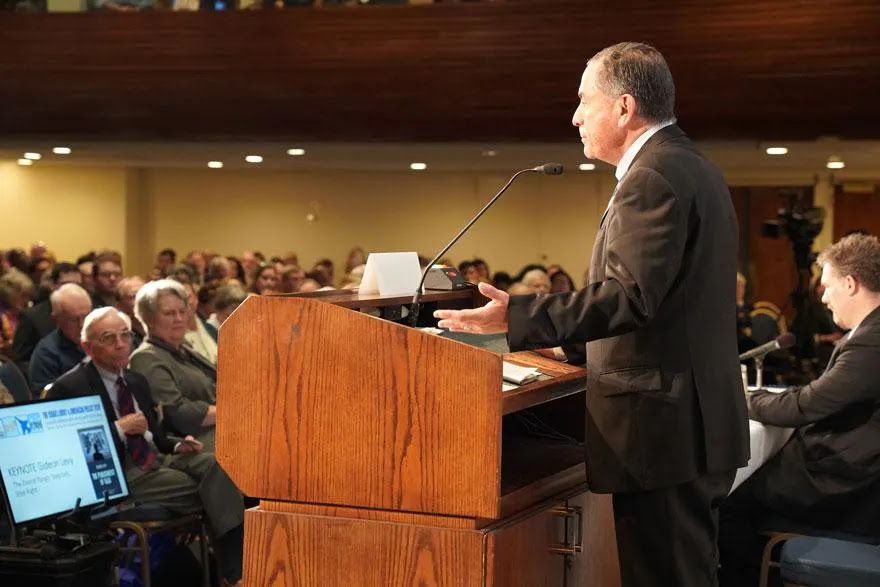
Staff Photo Phil Pasquini
Some of my ex-best friends are on their way now to the real thing, to the AIPAC conference which will start on this weekend—politicians, journalists, to what I call the annual drug dealer’s conference. They will discuss how many more drugs will they send to the Israel occupation-addicted state, how much more friendship will they express, and how much more money and weapons will they supply. I can tell you in the United States, as an Israeli, we don’t have a bigger enemy than the Jewish lobby. We don’t have a bigger enemy for justice, for peace, for equality than those who think that if you supply the drug addict with more drugs you are his friend; that if you support him blindly and automatically whatever he does, you are a friend. No, my friends, those are not friends, those are enemies. I can’t tell you how happy and proud I am to be here today and not there tomorrow.
The title of my lecture speaks about Zionism, and Zionism is one of the two religions of Israel. As a religion, as with any religion, you can’t question it. The second religion is obviously the religion of security. So between Zionism and security, anyone in Israel who dares to raise any kind of question mark is immediately perceived as a traitor. It’s impossible to describe to you what does it mean to say that you have some questions about Zionism. Imagine yourself if you question today the other religion, if you claim that the Israeli idea of the Israel Defense Forces [as the world’s most moral army] are not the most moral army in the world—let’s say they are the second most moral army in the world—how dare you!
We are getting it with the milk of our mothers, even though my mother was not such a Zionist, I think. But it’s very hard to understand from the outside how an ideology became part of the DNA, how an ideology became something which must be taken for granted and there is no room for any question marks. I know it about myself. I know how I grew up. I know what I thought about those very, very, very few who claimed that they were not Zionist or, God forbid, anti-Zionists. They were the Satans, even though they were Jews and Israelis.
I don’t recall one example on earth in which an ideology is so totalitarian, is so saintly, is so holy that you have no right to put any kind of doubts or question marks—nothing. Not about the past, not about the future, not about the present—nothing. It’s unbelievable when you live in a state in which, if you declare that you don’t accept this ideology, you are not part of the place. You are not part of society. You have no place there. Go to Gaza. Go to Damascus. Don’t stay here.
This leads me to the title. Because when it comes to Zionism—and friends, we have to face reality—when it comes to Zionism, there is no difference in Israel between left and right. When it comes to the occupation, which is part and parcel of Zionism, there is no meaningful difference between left and right in Israel. When I mean left and right, I mean this so-called Zionistic left, Labor and others, and the right-wingers. The difference is only by rhetoric. So those of you—and I know some of my Israeli friends who bought already some champagne bottles—ready to open them the moment that Binyamin Netanyahu will be impeached or even go to jail, and they will celebrate how Israel is coming from darkness to light, how freedom and peace is around the corner because we got rid of the tyrant, the right-winger, the fascist and after this the light is around the corner, I have bad news for you. Because by the end of the day, when you judge the real policy—not the rhetoric—yes, Labor and left are having much more sympathetic rhetoric between other sins that I committed.
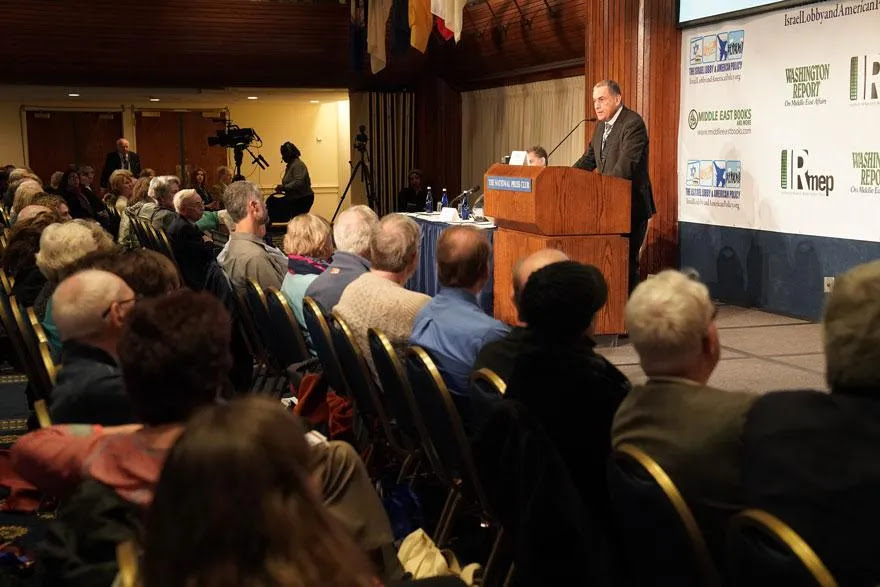
Staff Photo Phil Pasquini
One of my sins was working for Shimon Peres for four years. He didn’t stop talking about putting an end to the occupation. He didn’t stop talking about it’s not democratic and not justice that one people governs another people. Beautiful ideas that Binyamin Netanyahu and those right-wingers would have never said. But by the end of the day, Nobel Prize winner Shimon Peres is the founding father of the settlements project. So what do we get out of this nice rhetoric except showing a nice face of Israel and doing the very, very, very same crimes?
Benjamin Netanyahu
Israel PM
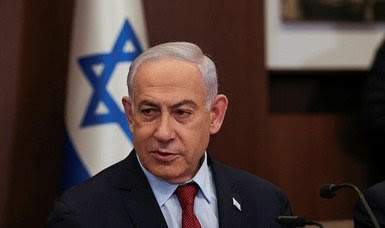
Israel PM Netanyahu says no peace until Hamas destroyed

Israel PM Netanyahu says no peace until Hamas destroyed
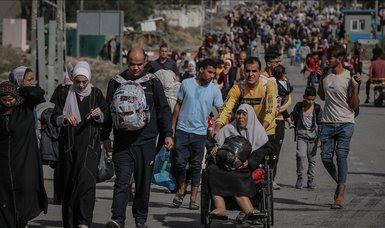
Palestine opposes Netanyahu's displacement plan of Palestinians from Gaza
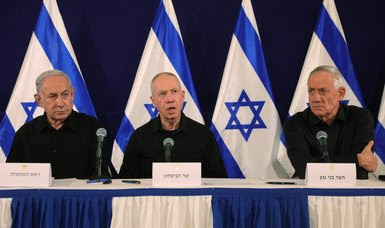
Netanyahu bars his defense minister from holding talks with Mossad chief on Israeli hostages:

Netanyahu pushes for 'voluntary migration' of oppressed Gazans to other countries
2018 The Zionist Tango: Step Left, Step Right
https://www.wrmea.org/2018-may/the-zionist-tango-step-left-step-right.html
GIDEON LEVY 2018 MAY POSTED ON MARCH 9, 2018Washington Report on Middle East Affairs, May 2018, pp. 44-51
Gideon Levy
Grant Smith: I’m very pleased to welcome back Haaretz columnist Gideon Levy. In his column in Haaretz, he’s called for greater Israeli empathy toward the suffering of Palestinians. He’s an extremely well-known commentator because of his willingness to take on tough issues. Consequently, he’s no stranger to very intense opposition. His columns about politics, money, how Israel’s military occupation is changing Israeli society, and U.S.-Israel relationships are very widely read, reposted and discussed around the world. Who doesn’t get in their inbox a Levy column once in a while? His vocal opposition to Israel’s last major invasion and bombing of Gaza took place against an enormous backdrop of widespread support for the military operation within the Israeli public, and so he gave voice to those who were secretly against the war but cautious about voicing such opinions openly.
He was the recipient, with Palestinian pastor Mitri Raheb, of the 2015 Olof Palme Prize for their fight against the occupation and violence. He has also received the Peace Through Media Award at the 2012 International Media Awards, the Euro-Med Journalist Prize for 2008, the Leipzig Freedom Prize in 2001, the Israeli Journalists’ Union Prize in 1997, and The Association of Human Rights in Israel Award for 1996.
I would like to encourage everybody to send in your comment cards. We have a number of students and interns who are circulating and picking those up so that we can have a very wide-ranging set of questions for Gideon when he finishes.
His book, The Punishment of Gaza, was published in 2012 by Verso Publishing House in London and New York. He will be available to sign some copies of that book during the reception. But now please welcome Gideon Levy.
Gideon Levy: Thank you. Thank you, Grant. I was wondering whom you were talking about. Can I stay here and not go back home?
It’s my third time here with these wonderful people and the third time—on one hand, I feel so much at home. I know so many faces. You all get younger, I get older. You all get more energized and more devoted, and I get more and more desperate. But it puts me also on a challenge because, already on my second time here I started my speech—as far as I can recall—with a concern that I’m going to repeat myself and bore you to death, because by the end of the day I’m a singer of one song and you’ve heard it already. But the organizers were sophisticated enough this time, and they gave a very strange title to my speech which doesn’t enable me to sing my song. I have to fit to a new song, so I’ll do my best. But I’m really, really so grateful for all the wonderful people who brought me here and Catrin, my partner. This day was so interesting for us, so enriching. In Hebrew we have this expression, “We came to strengthen and we came out strengthened.” And this is what I feel after a conference like this.
Maybe you are holding the key for any kind of change, for any kind of hope, because, as I’ll try to claim later on, the hope for change within Israeli society is so limited. It’s nonexistent. When the United States is still so crucial, people like you really can make the difference. People like you can really be a game changer, and I mean it. Never before have Israel and the United States shared the same values as in these days. The only place on earth that Donald Trump is beloved, admired, adored and appreciated is Israel. The only place that Binyamin Netanyahu is admired, adored, beloved is the United States. If this is not shared values, what is shared values?

Staff Photo Phil Pasquini
Some of my ex-best friends are on their way now to the real thing, to the AIPAC conference which will start on this weekend—politicians, journalists, to what I call the annual drug dealer’s conference. They will discuss how many more drugs will they send to the Israel occupation-addicted state, how much more friendship will they express, and how much more money and weapons will they supply. I can tell you in the United States, as an Israeli, we don’t have a bigger enemy than the Jewish lobby. We don’t have a bigger enemy for justice, for peace, for equality than those who think that if you supply the drug addict with more drugs you are his friend; that if you support him blindly and automatically whatever he does, you are a friend. No, my friends, those are not friends, those are enemies. I can’t tell you how happy and proud I am to be here today and not there tomorrow.
The title of my lecture speaks about Zionism, and Zionism is one of the two religions of Israel. As a religion, as with any religion, you can’t question it. The second religion is obviously the religion of security. So between Zionism and security, anyone in Israel who dares to raise any kind of question mark is immediately perceived as a traitor. It’s impossible to describe to you what does it mean to say that you have some questions about Zionism. Imagine yourself if you question today the other religion, if you claim that the Israeli idea of the Israel Defense Forces [as the world’s most moral army] are not the most moral army in the world—let’s say they are the second most moral army in the world—how dare you!
We are getting it with the milk of our mothers, even though my mother was not such a Zionist, I think. But it’s very hard to understand from the outside how an ideology became part of the DNA, how an ideology became something which must be taken for granted and there is no room for any question marks. I know it about myself. I know how I grew up. I know what I thought about those very, very, very few who claimed that they were not Zionist or, God forbid, anti-Zionists. They were the Satans, even though they were Jews and Israelis.
I don’t recall one example on earth in which an ideology is so totalitarian, is so saintly, is so holy that you have no right to put any kind of doubts or question marks—nothing. Not about the past, not about the future, not about the present—nothing. It’s unbelievable when you live in a state in which, if you declare that you don’t accept this ideology, you are not part of the place. You are not part of society. You have no place there. Go to Gaza. Go to Damascus. Don’t stay here.
This leads me to the title. Because when it comes to Zionism—and friends, we have to face reality—when it comes to Zionism, there is no difference in Israel between left and right. When it comes to the occupation, which is part and parcel of Zionism, there is no meaningful difference between left and right in Israel. When I mean left and right, I mean this so-called Zionistic left, Labor and others, and the right-wingers. The difference is only by rhetoric. So those of you—and I know some of my Israeli friends who bought already some champagne bottles—ready to open them the moment that Binyamin Netanyahu will be impeached or even go to jail, and they will celebrate how Israel is coming from darkness to light, how freedom and peace is around the corner because we got rid of the tyrant, the right-winger, the fascist and after this the light is around the corner, I have bad news for you. Because by the end of the day, when you judge the real policy—not the rhetoric—yes, Labor and left are having much more sympathetic rhetoric between other sins that I committed.

Staff Photo Phil Pasquini
One of my sins was working for Shimon Peres for four years. He didn’t stop talking about putting an end to the occupation. He didn’t stop talking about it’s not democratic and not justice that one people governs another people. Beautiful ideas that Binyamin Netanyahu and those right-wingers would have never said. But by the end of the day, Nobel Prize winner Shimon Peres is the founding father of the settlements project. So what do we get out of this nice rhetoric except showing a nice face of Israel and doing the very, very, very same crimes?
I’m here not to spread optimism, as you might know me by now. But when it comes to the basic, Israel is really united. I still remember, Grant, those days in which the joke was that three Israelis shared—sorry, I spoiled it. That two Israelis share three views. Today three Israelis share hardly one view and it will be not only Zionist, but pro-occupation. As you might know, occupation is off the table in Israel. Nobody talks about it. Nobody discusses it. Nobody’s concerned about the occupation. It is like one of those things—like the rain, like the sun—force majeure. Some like it. Some like it less. But nobody thinks that anything can be done about it. It doesn’t bother us so much, that’s the truth. It’s only half an hour away from our homes, but who hears about it and who cares about it?
The crimes are on a daily basis—really, a daily basis. The media hardly covers them. If they cover them, it will be always according to the Zionist narrative. A terrorist of 12, a girl of 14 with scissors in her hands, as an existential threat to the state of Israel. A girl who is slapping a soldier is someone who deserves a life sentence, not less than this. A girl that one hour before, her cousin was shot in his head 50 meters away from her home. So now the Israeli army claims that this was fabricated. I mean, even the Israeli propaganda has lost its shame. When Israel dares—dares—to claim that this child, Mohammed Tamimi—whom I met a few days after he was injured, he lost half of his brain—that he fabricated his injury, then you see that Israel is really desperate. If Israel needs this kind of level of propaganda, if Israel is getting so low in denying shooting in the head of a child of 15 and claiming that he fell from his bicycle, then you know that things are getting worse. Maybe it’s a hope for a new beginning, but right now look how low does it get there.
All those are passing Israeli society as if nothing is happening. No question marks, very little moral doubts if at all, a cover up, living in denial like never before. I cannot think about one society which lives in such denial like the Israeli society. Again, it includes left and right, except for the very devoted extreme left activists, let’s remember them. But they are really small in [numbers] and totally, totally, delegitimized. So when I speak about left, I mean Labor: Yeshuati—the new promise of Israeli politics, maybe the next prime minister—Yair Lapid and all the rest. In many ways they’re worse than the right-wingers because they feel so good about themselves, because they are so sure that they are so human and universal and moral. While the right-wingers at least don’t cover up, they say, yes, we are fascists. So what’s wrong about it? We are Jews and we have the right to be fascists. Because we are the chosen people, we have the right, and nobody’s going to tell us what to do.
When it comes to the central left, as it’s called—I can hardly pronounce it, central left, what do those people have to do with left? But when it comes to the central left, it’s a rare combination, you feel so good about yourself. You are not one of those fascists. You are not one of those nationalist racists, you are a liberal. But the occupation must go on, and the child—Ahed Tamimi—must stay in jail forever, and the crimes must continue because we have no other choice. Which brings me to the set of values which I see as the core of Israeli society nowadays, three or four sets of values which explain everything, in my view.
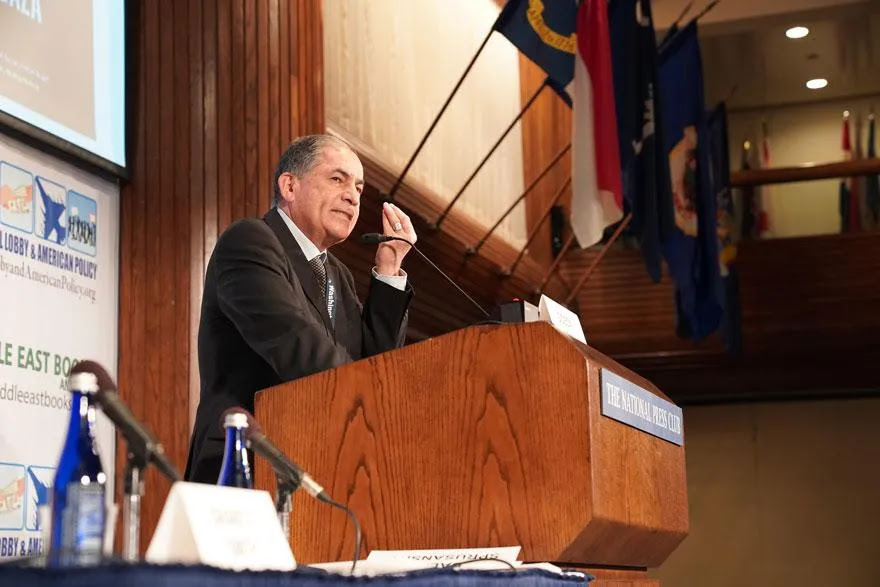
Staff Photo Phil Pasquini
The first very deep-rooted value, let’s face it, is the value that we are the chosen people. Secularists and religious [alike] will claim so. Even if they don’t admit it, they feel so. The implementation is very simple: If we are the chosen people, who are you to tell us what to do? Who are you? Who is the international community to tell Israel what to do? International law, wonderful thing—it doesn’t apply to us. It applies to any other place on earth, but not to Israel, because we are the chosen people. Don’t you understand it?
Asylum seekers—88 percent of the Eritreans are recognized as refugees in Europe. You know how many of them in Israel? Less than 1 percent—less than 1 percent! Why so? Because we are a special case, you don’t expect us to absorb 40,000 asylum seekers. How can you expect us? We can’t. We can’t. We are the chosen people and we don’t need to prove it.
The second very deep-rooted value is obviously the value of “we the victims”—not only the biggest victims, but the only victims around. I know many occupations which were longer than Israeli occupation, some were even more brutal, even though it’s getting harder and harder to be more brutal than the Israeli occupation. I don’t recall one occupation in which the occupier presents himself as the victim—not only the victim, the only victim. If to paraphrase here, if to quote here the late Golda Meir—whom I quoted also last time, I know, but it is so unforgettable I have to use it again. She once said that “we will never forgive the Arabs for forcing us to kill their children.” We are the victims. We are forced to kill their children—poor us. As the victim and the only victim in history, again, it [gives] us the right to do whatever we want, and nobody is going to tell us what to do because we are the only victims.
To this there’s a third very deep-rooted value, and this is the very deep belief—again, everyone will deny it, but if you scratch under the skin of almost every Israeli, you’ll find it there: The Palestinians are not equal human beings like us. They are not like us. They don’t love their children like us. They don’t love life like us. They were born to kill. They are cruel. They are sadists. They have no values. No manners. Look how they kill us.
This is very, very deep-rooted in Israeli society, and maybe that’s the key issue, because as long as this continues, nothing will move. As long as most of the Israelis don’t perceive the Palestinians as equal human beings—we are so much better than them, we are so much more developed than them, and we are so much more human than them. As long as this is the case, all our dreams—and we have some dreams, and I’ll get to them—all our dreams will never become true as long as this core issue will not change. So you have a society with a deep conviction in its justice, in its right way, with very, very few question marks. Anyone who dares to raise a question mark is immediately, in a systematic way, is immediately erased, demolished. It’s unbelievable how this machinery works in Israel.
We are talking here about how efficient the Jewish lobby is here. Look at the Jewish [group], so-called in Israel: Breaking the Silence. For years we were dreaming about the day that soldiers will stand up and say the truth, not Gideon Levy, the liar, the traitor who tells us all kind of stories about Israeli crimes. No. Soldiers who have committed those crimes will just come and testify about what they have been doing. And here it came.
Over 1,000 testimonies of soldiers who in a very brave way gave their testimonies about what they have been doing in the occupied territories throughout the years. This should have been an earthquake in any healthy society. It’s our sons. But what happened? Nothing. Breaking the Silence was immediately delegitimized by the establishment, with the typical collaboration of the Israeli media. I’m afraid to say that Breaking the Silence is crushed today. This is just one example.
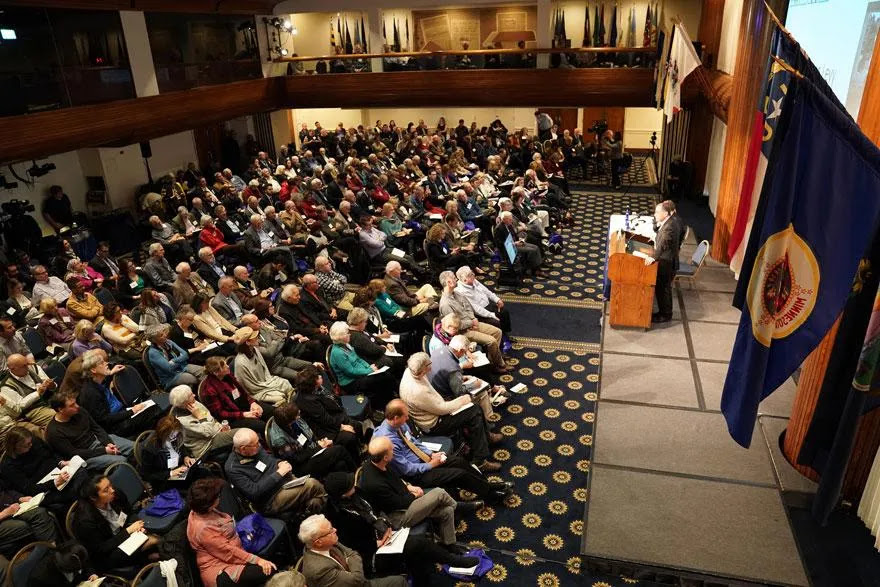
Staff Photo Phil Pasquini
Israeli society, especially in the last years, has a very clear intention to crush any kind of criticism from within and from outside. This is going through legislation, through campaigns, through the media. It’s just in its beginning. In this way, I must say, there might be a slight difference between so-called left and right in Israel, because the Israeli left has some kind of commitment, at least for the democracy for the Jews, because, as you might know, Israel is maybe the only place on earth with three regimes.
We are having three regimes. One is the so-called liberal democracy for Jewish citizens, which has many cracks now, but it is still functioning. I have total freedom in Israel, this must be mentioned here. I write whatever I want. I appear on TV. I can’t claim that someone is shutting my mouth, except people in the street who wouldn’t like to see me or spitting at me or who are threatening me. But by the end of the day this freedom, which I don’t take for granted and might not last for long, this freedom is there. So that’s the first regime in the front.
Then comes the second regime, a very discriminative regime toward the Israeli Palestinians: the Palestinians of ’48, the Israeli citizens who are Palestinians, 20 percent of the population. They are discriminated in any possible aspect of life, but they gain formal equal civil rights. They vote. They elect. They could be voted [for]. They can be elected. That’s the second regime.
Obviously the third regime, which Israel is hiding, is the military occupation, the military regime in the occupied territories. Here I allow myself to say with no doubt that this is today one of the most brutal, cruel tyrannies on earth. Not less than this. I repeat it—the military occupation in the occupied territories is today one of the brutal, cruel tyrannies on earth. How dare someone call Israel the only democracy in the Middle East, when in its backyard there is one of the most cruel, brutal tyrannies in the world? How can you do it? Can you be half pregnant? Can you be half democratic? Can you be a democracy in the front and a tyranny in your backyard?
Here comes the next lie that we should fight: the claim that it is all temporary. No, my friends, it was never meant to be temporary. It is not temporary and it will not be temporary, if it depends on Israel. There was never an Israeli statesman in an important position and in an influential position, prime minister or so, who really meant to put an end to the occupation—none of them. Some of them wanted to gain time in order to strengthen the occupation. Some others wanted to gain time by getting all kinds of interim agreements, just for gaining time. Some others wanted to be perceived by the world, to be hugged by the world, as people of peace. But none of them had the intention to put an end to the occupation. How do I know it? I don’t know what is in their hearts, I know only one thing: Israel has never stopped building settlements. Anyone who builds one house in the occupied territories has no intention whatsoever to put an end to the occupation! And those bluffs should be called.
Here I come to you all, I’m very, very skeptical about change from within the Israeli society, because life in Israel is far too good and the brainwashing system is far too efficient. To have a dialogue today with most of Israelis is, even for me, almost an impossible job. Really, it’s many times I find myself together with Catrin, where we meet ordinary Israelis, good people, they would volunteer anywhere. But when you start to talk with them about the occupation, after two minutes you want to just tear your hair [out]. I mean, you don’t know what to do, you don’t know where to start, the brainwashing is so deep and the denial is so deep. The ignorance, the ignorance, they know nothing. Anyone in this hall knows so much more about the occupation than any average Israeli, including those who serve there in the army. They know nothing, and what they know is wrong.
So to expect a change from within this society, when restaurants are packed, when life is beautiful, when there is hardly terror in Israel—I mean what they call terror, with those exploding buses and all those things. The only violent attacks are mainly now in the occupied territories. Not in Tel Aviv. Tel Aviv is living a very, very peaceful secure life. So, to expect this society to stand up and to say no more—out of what, what incentive? So as long as this balance is that Israel is either gaining out of the occupation or not paying anything for it, as long as any kind of Israeli doesn’t feel that the occupation is something you should think about, why should he be bothered? He doesn’t pay. He’s not punished. And even if he’s paying, he does not make the linkage. Because even if there were those years of the second intifada which were really, really bloody, with exploding buses and suicide bombers, nobody made the linkage to the occupation. If you dare to make the linkage, you will be immediately accused as a traitor, because how dare you, because you justify terror. So they explode buses because they were born to kill. It has nothing to do with the occupation. So there was no progress or change, even after the violence.
So if life is so good, there’s really no reason to go for change. Therefore, the hopes for change from within the Israeli society are really, really very minimal. Again, with all due respect to those groups who are fighting, who are not giving up, who are struggling, who are going to demonstrate every Friday in another village against the fence, against the occupation, against all those things—wonderful people, including many, many young people—but, finally, it is a small group and delegitimized. Therefore, people like me, my only hope is from people like you. This is right now the only hope.
We are hearing here today all day, including from Grant’s very, very knowledgeable lecture, figures that are depressing even to me. The Jewish lobby is so strong yet. But by the end of the day, let’s see it in a more realistic way. They are moving now the American Embassy to Jerusalem—big victory for Israel, big victory for the occupation. By the end of the day, what does it mean? It means that the United States has declared officially the death of the two-state solution. It means that the United States has declared officially what we knew for many, many years: that the United States is not and cannot be a fair mediator. It declared that the United States is officially the friend of the occupation, and only of the occupation. It declared officially that the funeral of the two-state solution and the funeral of America as a mediator in the Middle East went to its way already.
For the long run, I see it as an achievement. End of the masquerade. End of the masquerade and of the lip service. I’m very grateful—you’ll be surprised—to Donald Trump, who brought us there. Now I just feel sorry for one person—but you know, this is not so much. I really feel so much sympathy, empathy and sorrow for Ambassador David Friedman. He will have to move from Herzliya by the sea, from this lovely villa, to Jerusalem. Believe me, he deserves it.
The ambassador of the settlements wears the costume of the American ambassador. He’s even not the ambassador of Israelis. He’s ambassador of the settlements project—and not of all settlements, just the extreme ones, if there is a difference—[who] will have to move to Jerusalem. What is a bigger gift for all of us than to see him among the Orthodox, among the tensions, among the border police at every corner, with all the violence and the tension and the occupation in every step you step in Jerusalem? What will be more of a gift for us than to see him there, rather than to see him in front of the sea of Herzliya? So we shouldn’t give up.
If I may, with all my modesty, my ideas for what you should do—whom I am to tell you? I hardly know what to tell myself to do—but still, I saw it in three main issues right now. One must be to fight this unbelievable process of criminalization of criticizing Israel. This must stop, and we shouldn’t give up. We heard today that it’s not only about BDS anymore. Now it’s about any critic of Israel. The fact that someone who raises his voice for justice is criminalized is first of all a domestic problem. What kind of society is this? What kind of society is this that criminalizes those who support justice and praises those who support the violations of international law, the crimes?
So this should be one of our goals, not to give up. When they call you anti-Semites—here it’s easier, in Europe they get paralyzed. If you call someone anti-Semite in Europe, he’s paralyzed. And they take advantage of it in a very manipulative way. Don’t let them. You should be proud in raising your voice. BDS right now is the only game in town. BDS is a legitimate tool. Israel is using it by calling the world to boycott Hamas, to boycott Iran. You have the full right not to buy products from sweatshops in South Asia. You have the full right not to buy products from a shop which sells meat. You have the full right not to buy products from a country or from an area that you feel that something is wrong there. What does it mean that you should apologize for boycotting something that deserves boycott?
BDS, one can claim that it has not yet reported about real success, economic successes, maybe. But we have one proof why BDS is the right thing to do: Look how Israel gets nervous about BDS. If they get so nervous about it, you can know that’s the right way.
Grant, if you’ll invite me next year again, or in two years, I’m not sure I will be able to say those sentences, because those sentences very soon will become a violation of Israeli law. You are not allowed to call people to boycott Israel, but let’s challenge them.
The second challenge that I see for you is to try to tear, especially in this country, the lie that Israel is the only democracy in the Middle East. We need it desperately. It’s all about the truth. It’s all about telling the people the truth. As I said before, a state which possesses one of the most brutal tyrannies on earth cannot be called a democracy—period.
The last lie that you have to fight, or I allow myself to suggest to you to fight, is the lie that all of this is temporary. After 50 years of occupation—why would we say after 50 years? After 100 years of occupation or after 70 years of occupation—because ’48 never stopped, let’s remember it. It’s the same policy. Those are the same methods, same lies, same brainwash, same explanations and excuses. As long as this continues, nobody can claim that this is temporary. The occupation is there to stay and we should call the bluff and say this colonialistic project has no intention to come to its end, even though here and there are some statements or politicians who claim so. No, you never had an intention to put an end to it, and you don’t have it.
As it says zero, zero, zero in my timer—is it an appreciation for my talk, Grant, three zeroes? In any case, my last sentence would be what should be the solution. It was mentioned here; therefore, I’m not getting into elaborating on it, but I just feel committed to say so. For many years I was a great supporter of the two-state solution. I saw that the two-state solution is a reasonable and achievable solution. Total justice will never be achieved in this part of the world, but I saw that this will be a relatively fair and just solution, even though a lot of injustice is about it.
Above all, we are [talking] about 22 percent [of the land] to the Palestinians and 78 percent to the Jews. While we are facing today—I don’t know how many of you are familiar with the very dramatic fact that today, already today, between the Jordan River and the Mediterranean, they are exactly 50-50: 6 million Palestinians and 6 million Jews. If you count 2.5 million in the West Bank, 2 in Gaza and 2 in Israel, you get over 6 million Palestinians, and there are 6 million Jews, roughly speaking. Maybe I’m wrong in some figures, but it is roughly half and half. Two peoples equal, right now.
So if someone thinks that one people can dominate another people—and let’s get back to Zionism and to the title of this talk—the basis of Zionism is that there is one people which is privileged over the other. That’s the core. This cannot go on. If it goes on, it has only one name. Here we call it apartheid.
So I totally join your analysis today [pointing to Dr. Virginia Tilley], which I learned a lot from, and others. Even if it sounds now like a utopia, even if it sounds now like something unthinkable, it’s time for us to change the discourse. It’s time for us to talk about equal rights; about one person, one vote. And let’s challenge Israel. Israel will say no. Then we can officially declare Israel as an apartheid state, because there is no other way. If you deny equal rights, you are not a democracy officially. It’s not a question of point of view, of opinion. It’s a matter of fact. Israel obviously will say no. But we shouldn’t give up, because by the end of the day I truly believe that Palestinians and Israelis, Palestinians, Jews, can live together. We tried it in the past. It is being tried today in all kinds of small frameworks. We can really live together, believe me.
I’d rather have a Palestinian prime minister than Yair Lapid or Binyamin Netanyahu. So by the end of the day we should be clear about the hope, about the vision. We should understand that the road is still very, very long to go. We’re just in the beginning. But unlikely, at least for me, unlikely in the last years in which I continued to say, almost in my sleep, two-state, two-state solution, two-state solution—knowing that it will never happen, knowing that no one is going to evacuate 700,000 settlers, knowing that nobody meant to do it, and knowing that it will not solve the basic problem.
So we have a vision, we have meanwhile some goals. There’s so much work to do for you and for us, so let’s not waste more time on talking. Thank you very much. [Standing Ovation]
Questions and Answers
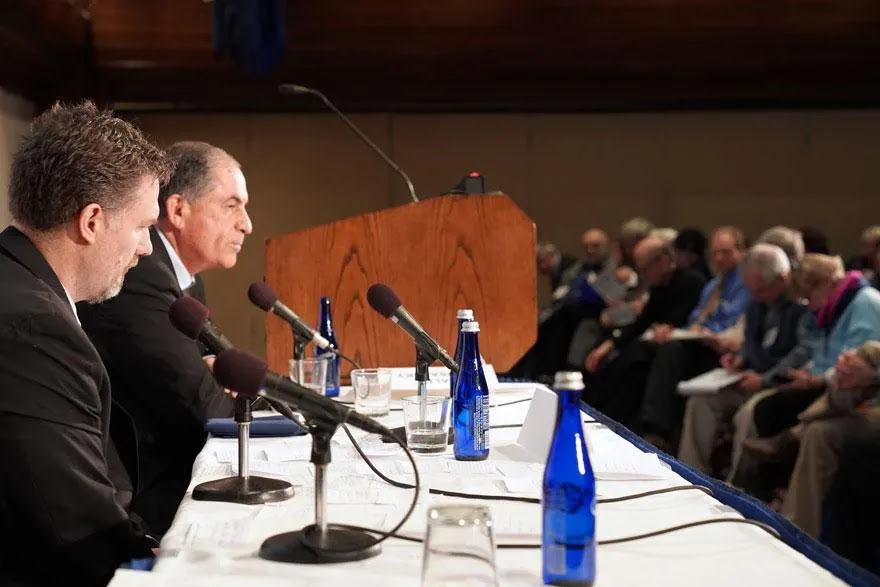
Staff Photo Phil Pasquini
Grant Smith: We’ve got time for just a couple of questions. He managed to outpace a lot of these questions, so it’s rather easy. I’ll let him take a sip of water first. But one of the questions is, could the occupation continue to exist without United States’ support? Please elaborate.
Gideon Levy: Could the occupation continue? Yes. Could it continue without the United States? Even not for a few months. This must be clear: if there would have been an American president who would really like to put an end to the occupation, the occupation would have ended a long time ago. There was never an American president who wanted it so.
Grant Smith: The other question is extremely interesting. An esteemed scholar made this argument to me last night. I’m not going to say who it was, but his first name starts with an N and the second name starts with an F. Anyway, this is his argument. It says, what do you say to those who say that BDS furthers Israeli narratives about being victims and needing security?
Gideon Levy: This is a very good question. We know from the past that many times pressure from the outside united Israel—but only for the first time, for the first while, for the first period of time. By the end of the day, we have to confront the Israelis with their reality, because they are totally disconnected from reality. I want to see the Tel Avivian who will realize that if he wants to go to Europe, he needs a visa. If he wants to export some of his goods, he’s going to work very hard to do so—if at all. Then he will ask himself, is it worth it? Is it really worth it? I can assure you that after the first rhetoric of “we are all united against the whole world, which is always against us, and they all hate us,” then rationality will come into the picture.
I once thought that Austrian Airlines can bring peace. How can this be? Because in the last attack of Israel on Gaza in 2014, some airlines stopped flying to Israel, it happened to be that Austrian was the first one. I think it lasted like 20 hours—but in those 20 hours, Israelis went mad. I mean, Israelis lost their temper. It was crazy. Then I thought, imagine yourself that Austrian Airlines—that’s just a daydream—Austrian Airlines declares that as long as the occupation continues, Austrian Airlines is not flying to Israel. The occupation comes to its end within days. When Israelis will be prevented to get to Macy’s for their shopping or to get to Galeries Lafayette in Paris for their shopping, this will be the day that the occupation will be over.
Grant Smith: Thank you. So this question says, it seems many Israelis who become fully disillusioned simply leave Israel. Is there any hope of Israel changing from within when you have so many people with somewhat similar views to yours leaving?
Gideon Levy: Unfortunately, we can’t count on this. Yes, there are good Israelis who cannot take it anymore, and some of them are leaving. I hear more and more Israeli parents, which I never heard before, who wish that their children will not stay there. This I never heard before, because for parents it was always a catastrophe if some of their children would leave. You hear it more and more, obviously in very certain circles. But by the end of the day, when we look at the figures, those are not meaningful figures. Yes, there are some good ones who leave. Yes, many more are talking about it. But by the end of the day, this will not be a game changer, not for the time being.
Grant Smith: Last question. It says, “You have many readers in Israel and abroad, and you can say so many things that journalists in the U.S. can’t seem to find a way to do. Why is it that you get to be Gideon Levy and nobody else does?”
Gideon Levy: As if it is such a great fun to be Gideon Levy! I wish I wasn’t—I wish I was a restaurant critic, going from one restaurant to the other and writing my truths about the food that I had, and nobody would have raised this question. Really, it’s not for me to answer. As I said here last time, I always say, I was really a good boy in Tel Aviv. I was really raised up to be something else. Something went wrong, but now it’s too late to correct it. I’m trying, but I really don’t have any other choice but to continue. Many times people say, keep up your good work and so on and so forth and so forth. I don’t have really any other choice. It’s even not a question of choice. It’s—I’m doomed to it, yeah.
But seriously speaking, the fact that I can still raise my voice, as I said before, should not be taken for granted. If this regime, this government, or a very similar government, will continue in the same way, they will get to us as well. Haaretz is an island in Israel. Don’t get it wrong. Haaretz is not Israel. Haaretz is really an island in a very, very stormy ocean. They’ll do anything possible to close Haaretz down. The fact that I have such a wonderful home was such a—really, I don’t think there is one publisher in the world, when he gets a protest or a reader or a subscriber who is very angry at me, you know what he tells them? He tells them, “Haaretz is not the newspaper for you, don’t read it.” A publisher—a publisher who is really struggling for the existence of Haaretz, we are really struggling for each reader and each subscriber—and he says, you know, it’s not for you. It’s not for you.
So these are really very little hopes, but maybe it’s good to conclude this afternoon with some kind of hope and optimism. As long as Haaretz is there, I will be there—hopefully. As long as this voice is still being raised, maybe there is a hope. I don’t know. But thank you so much again for coming today. Thank you.
Jewish religious leader reveals how he feels about Israeli aggression in Gaza TRT World Now
Jewish religious leader reveals how he feels about Israeli aggression in Gaza TRT World Now
Jewish religious leader reveals how he feels about Israeli aggression in Gaza TRT World Now
Jewish religious leader reveals how he feels about Israeli aggression in Gaza
TRT World Now
591K subscribers
Yisroel Dovid Weiss, Rabbi and spokesman for Neturei Karta, talks to TRT World about the Israeli attack on Palestine. #Israel #Palestine #Gaza Subscribe: http://trt.world/subscribe Livestream: http://trt.world/ytlive Facebook: http://trt.world/facebook Twitter: http://trt.world/twitter Instagram: http://trt.world/instagram Visit our website: http://trt.world
Netanyahu accuses Palestinian Authority of seeking to destroy Israel ‘in stages’
Netanyahu accuses Palestinian Authority of seeking to destroy Israel ‘in stages’
Anadolu Agency MIDDLE EAST
Published December 11,2023
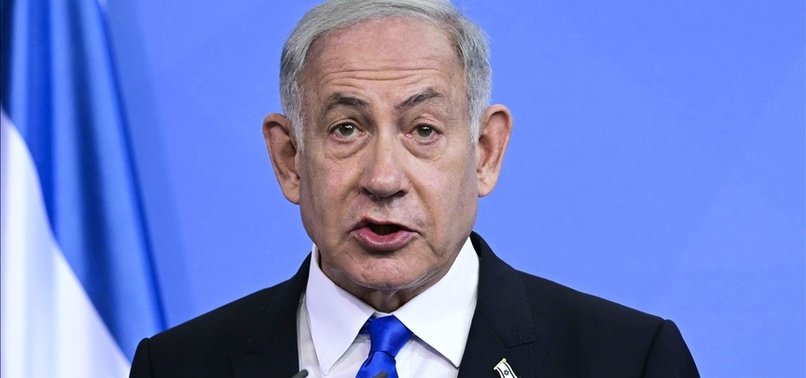
Israeli Prime Minister Benjamin Netanyahu on Monday accused the Palestinian Authority (PA) of seeking to destroy Israel "in stages".
"The difference between Hamas and the PA is only that Hamas wants to destroy us here and now, the PA wants to do it in stages," Netanyahu said in a closed-door meeting for the Knesset's Foreign Affairs and Defense Committee as cited by Israeli Channel 12.
There was no comment from the Ramallah-based authority on Netanyahu's accusation.
Netanyahu opposes U.S. efforts to allow the PA to govern the Gaza Strip following the end of the ongoing Israeli war on the blockaded territory. Washington, for its part, argues that there must be a Palestinian authority or government in Gaza in the post-war period.
Hamas seized control of the Gaza Strip in 2007 after ousting the PA forces following infighting. The PA rule has been confined to the West Bank ever since.
Israel resumed its military offensive on the Gaza Strip on Dec. 1 after the end of a weeklong humanitarian pause with the Palestinian group Hamas.
Nearly 18,205 Palestinians have been killed and more than 49,645 others injured in relentless air and ground attacks on the enclave since Oct. 7 following a cross-border attack by Hamas, according to Gaza's health authorities.
The Israeli death toll in the Hamas attack stood at 1,200, according to official figures.
Corruption trial of Israel PM Netanyahu to resume in February
Corruption trial of Israel PM Netanyahu to resume in February
According to The Jerusalem Post, Israel's High Court of Justice has announced that the trial of Prime Minister Benjamin Netanyahu will continue in February. This comes as he faces charges of bribery, fraud, and breach of trust.
Anadolu Agency WORLD
Published December 25,2023
SUBSCRIBE
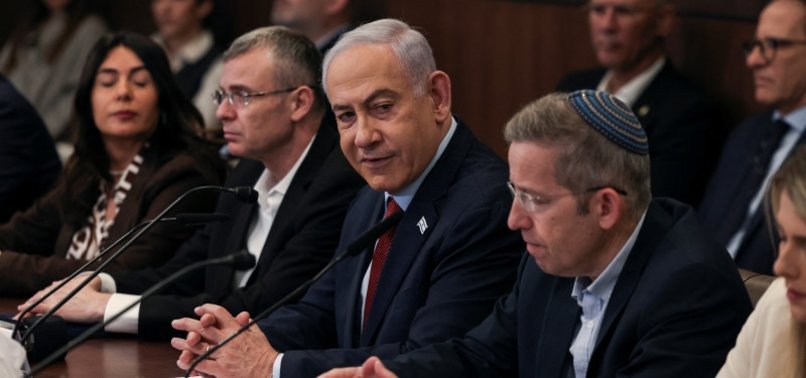
The trial of Israeli Prime Minister Benjamin Netanyahu is expected to resume in February, according to Israel's top court on Monday.
"Netanyahu's trial on charges of bribery, fraud, and breach of trust will resume starting February," the High Court of Justice said in a statement cited by The Jerusalem Post.
The trial was scheduled to resume in October, but was halted following a cross-border attack by Hamas on Oct. 7 with Israel launching a retaliatory military offensive on the Gaza Strip that killed at least 20,674 Palestinians, mostly women and children, and injured 54,536 others, according to local health authorities.
Netanyahu's trial resumed in December by the court acceded to a defense request that hearings be held only twice a week, citing the premier's lack of availability to prepare for the testimonies of new key witnesses amid the Gaza war.
Netanyahu faces charges of bribery, fraud, and breach of trust in one case, and charges of fraud and breach of trust in two other cases. He denies wrongdoing.
The first session of Netanyahu's corruption trial was held on May 24, 2020.
At least 16 cemeteries in Gaza have been desecrated by Israeli forces, satellite imagery and videos reveal
https://edition.cnn.com/2024/01/20/middleeast/israel-gaza-cemeteries-desecrated-investigation-intl-cmd/index.html
By Jeremy Diamond, Muhammad Darwish, Abeer Salman, Benjamin Brown and Gianluca Mezzofiore, CNN 7 minute read Published 12:00 AM EST, Sat January 20, 2024Tel AvivCNN —
The Israeli military has desecrated at least 16 cemeteries in its ground offensive in Gaza, a CNN investigation has found, leaving gravestones ruined, soil upturned, and, in some cases, bodies unearthed.
In Khan Younis, in southern Gaza, where fighting escalated earlier this week, Israeli forces destroyed a cemetery, removing bodies in what the Israel Defense Forces (IDF) told CNN was part of a search for the remains of hostages seized by Hamas during the October 7 terror attacks.
 Tread marks left behind by Israeli armored vehicles that destroyed a cemetery near the Al Nasser Hospital in Khan Younis, Gaza, on January 17.Jehad Alshrafi/Anadolu/Getty Images
Tread marks left behind by Israeli armored vehicles that destroyed a cemetery near the Al Nasser Hospital in Khan Younis, Gaza, on January 17.Jehad Alshrafi/Anadolu/Getty Images
CNN has reviewed satellite imagery and social media footage showing the destruction of cemeteries and witnessed it firsthand while traveling with the IDF in a convoy. Together the evidence reveals a systemic practice where Israeli ground forces have advanced across the Gaza Strip.
The intentional destruction of religious sites, such as cemeteries, violates international law, except under narrow circumstances relating to that site becoming a military objective, and legal experts told CNN that Israel’s acts could amount to war crimes.
A spokesman for the IDF could not account for the destruction of the 16 cemeteries CNN provided coordinates for, but said the military sometimes has “no other choice” but to target cemeteries it claimed Hamas uses for military purposes.
The IDF said rescuing the hostages and finding and returning their bodies is one of its key missions in Gaza, which is why bodies were removed from some gravesites.
“The hostage identification process, conducted at a secure and alternative location, ensures optimal professional conditions and respect for the deceased,” an IDF spokesperson told CNN, adding that bodies determined not be those of hostages are “returned with dignity and respect.”
But in other cases, the Israeli military appears to have used cemeteries as military outposts. CNN’s analysis of satellite imagery and videos showed that Israeli bulldozers turned multiple cemeteries into staging grounds, leveling large swaths and erecting berms to fortify their positions.
In the Shajaiya neighborhood of Gaza City, Israeli military vehicles could be seen where the cemetery once stood, with berms surrounding them on all sides. The central part of the Shajaiya cemetery was cleared before the war, according to local media reports. But satellite imagery showed other portions were more recently bulldozed, and an IDF presence visible, from December 10.


Shajaiya cemetery, in Gaza City.
On December 18, the IDF published an undated photo of what they said was a Hamas rocket launcher on the grounds of Shajaiya cemetery. CNN could not independently verify when or where the photo was taken.
A similar scene of destruction was visible at the Bani Suheila cemetery, east of Khan Younis, where satellite imagery revealed the graveyard’s deliberate and progressive bulldozing, and the creation of defensive fortifications over the course of at least two weeks in late December and early January.
Bani Suheila cemetery, east of Khan Younis.
At the Al Falouja cemetery in the Jabalya neighborhood, north of Gaza City, the Al-Tuffah cemetery, east of Gaza City, and a cemetery in Gaza City’s Sheikh Ijlin neighborhood, destroyed tombstones and heavy tread marks pointed to heavily armored vehicles or tanks driving over graves.
The armored personnel carrier transporting a CNN team last week drove directly through the New Bureij cemetery in Al-Bureij, a Palestinian refugee camp in central Gaza, on its way out of the strip. Graves were visible on either side of the newly-bulldozed dirt road, as seen on a screen inside the vehicle showing a live feed from its front-facing camera. CNN confirmed the location of the cemetery by geolocating its footage from inside Gaza that day and checking against satellite imagery.
New Bureij cemetery in Al-Bureij, a Palestinian refugee camp in central Gaza.
Other cemeteries analyzed by CNN in satellite imagery showed little to no signs of destruction, or military fortifications, among them two cemeteries where fallen soldiers from World War I and II, including Christians and some Jews, are buried.
The IDF spokesman did not explain why large swathes of cemeteries had been bulldozed to convert them into military outposts or why military vehicles were parked where graves once stood. “We have a serious obligation to the respect of the dead and there is no policy to create military posts out of graveyards,” the spokesman told CNN.
 In response to CNN’s request for comment on the damaging of graves in Khan Younis, the IDF said it was exhuming bodies in Gaza as part of a search for the remains of hostages seized by Hamas.Jehad Alshrafi/Anadolu/Getty Images
In response to CNN’s request for comment on the damaging of graves in Khan Younis, the IDF said it was exhuming bodies in Gaza as part of a search for the remains of hostages seized by Hamas.Jehad Alshrafi/Anadolu/Getty Images
Israeli forces severely damaged the cemetery in Khan Younis between Monday night and Wednesday morning, as they moved in on the area surrounding the Al Nasser Hospital compound and a Jordanian field hospital, according to satellite imagery and videos reviewed and geolocated by CNN.
The IDF told CNN that when “critical intelligence or operational information is received,” it conducts “precise hostage rescue operations in the specific locations where information indicates that the bodies of hostages may be located.”
Israel has said that 253 people were taken hostage during the Hamas terror attacks on October 7 and believes 132 hostages are still in Gaza – 105 of them alive and 27 dead.
‘I couldn’t find her grave’
Munther al Hayek’s daughter Dina was killed in the 2014 Gaza war. In early January he visited Dina’s grave at Sheikh Radwan cemetery in Gaza City, but she wasn’t there. He tried to find his grandmother’s grave. It wasn’t there either.
“The occupation forces destroyed and bulldozed them,” Hayek, a spokesman for the Palestinian opposition group Fatah in Gaza, told CNN. “The scenes are horrific. We want the world to intervene to protect Palestinian civilians.”
Mosab Abu Toha, a poet from Gaza whose work has been published in the New York Times and the New Yorker, also learned that the cemetery where his younger brother and grandfather are buried was heavily damaged by the Israeli military.
Now safe in Cairo, Abu Toha told CNN how on December 26 his brother called him from the Beit Lahia cemetery, in northern Gaza, looking for his loved ones and unable to find them.
The occupation forces destroyed and bulldozed them… The scenes are horrific. We want the world to intervene to protect Palestinian civilians.”
Munther al Hayek, whose daughter's grave was destroyed
In a recording of their video call, seen by CNN, rubble litters the land where the cemetery once stood. Tread marks from heavy military vehicles crisscross the cemetery in satellite imagery.
The death toll in Gaza is growing by the day. More than 24,000 Palestinians have been killed in Israeli attacks, according to the Hamas-controlled Ministry of Health in Gaza. Burials often happen quickly in accordance with Islamic practice, and, since the war began, the dead have often been buried in mass graves.
In late December, Israel returned the bodies of 80 Palestinians killed in the war, saying that it had confirmed they were not Israeli hostages taken by Hamas. Palestinian media reports at the time said the corpses returned were unidentifiable. CNN cannot independently verify those claims.
Respecting the dead
International law experts say the desecration of burial grounds contravenes the Rome Statute, the 1998 treaty that established and governs the International Criminal Court (ICC) to adjudicate war crimes, genocide, crimes against humanity, and crimes of aggression. Israel, which originally supported the creation of the court, did not ratify the Rome Statute.
Cemeteries are given protections as “civilian objects” under international law and are afforded special protections, with limited exceptions.
Cemeteries can only be attacked or destroyed if the other warring party uses them for military purposes, or if doing so is deemed a military necessity, with the military advantage gained outweighing the damage to civilian objects.
“The civilian nature of the cemetery remains intact to some extent. So someone who wants to attack a cemetery still has to take into account the kind of civilian use of the graves and the civilian importance of the cemetery, and has to minimize damage to that civilian function of the cemetery,” Janina Dill, co-director at Oxford University’s Institute for Ethics, Law and Armed Conflict, told CNN.

RELATED ARTICLEIsrael says it is exhuming bodies in Gaza to determine if they’re hostages
South Africa raised the IDF’s destruction of graveyards in Gaza as part of its case at the International Court of Justice arguing Israel is committing genocide. Israel denies the allegation, but Dill said that while the destruction of cemeteries alone does not amount to genocide, it can add to evidence of Israel’s intent.
“There’s huge symbolic meaning to the notion that not even the dead are left in peace,” Dill said. “International humanitarian law protects the dignity of people who are outside of combat or the combat, and that protection doesn’t end when they die.”
But, in at least two cases, it is clear pains have been taken to respect the dead – at cemeteries where Palestinians aren’t buried.
Just a half mile away from the destroyed Al-Tuffah cemetery, east of Gaza City, a cemetery holding the bodies of mostly British and Australian soldiers who died in World War I and II stands largely intact. A crater on the burial grounds appears in satellite imagery between October 8 and October 15, but it has otherwise been untouched by the war.
A second cemetery administered by the Commonwealth War Graves Commission in central Gaza offers an even starker example. Mangled vehicles and destroyed roads lay all around the cemetery. But the graveyard itself, which contains the graves of mostly Christians and some Jewish soldiers from World War I, is intact.
What is happening is a clear violation of these basic rules and considered a war crime of ‘committing outrages upon personal dignity’ under the Rome Statute.”
Muna Haddad, a human rights lawyer
Israeli soldiers even posed with an Israeli flag by the grave of a Jewish soldier buried there and another image posted to social media shows a tank sitting on the edge of the graveyard – respecting the sanctity of that hallowed ground.
The respect of some dead, but not others, is in contravention of international law, Muna Haddad, a human rights lawyer and researcher on the treatment of the dead, told CNN.
“What is happening is a clear violation of these basic rules and considered a war crime of ‘committing outrages upon personal dignity’ under the Rome Statute,” she said.
Israel is destroying itself with its settlement policy Intelligence Squared
Jewish religious leader reveals how he feels about Israeli aggression in Gaza TRT World Now
Israel is destroying itself with its settlement policy Intelligence Squared
678K subscribers
Want to join the debate? Check out the Intelligence Squared website to hear about future live events and podcasts: http://www.intelligencesquared.com __________________________ http://www.intelligencesquared.com/ev... "Israel is Destroying Itself With its Settlement Policy: If Settlement Expansion Continues Israel Will Have No Future" Filmed at the Royal Geographical Society on 15th January 2013. Patriacide. Nationcide. Whatever you want to call it, that is what Israel is doing with its settlement policy: it is killing itself. If ever greater numbers of Jewish settlers are installed on land regarded by Palestinians as the basis for a state of their own, the possibility of a two-state solution grows ever more remote. Yet the single state alternative, involving annexation of the West Bank, would result in a country where Arabs vastly outnumber Jews and then you won't have a one-state or a two-state solution: you'll have a no-state solution. For those who love Israel and wish to preserve a democratic Jewish homeland, as much as for those who hate it, the settlements must stop. That's what many left-wing Israelis and their friends say. But defenders of the settlements see things very differently. The two-state solution has long been a dead letter in their view: why stop building settlements in the name of a peace plan that is frankly unattainable? Whatever the eventual solution -- it could even be a West Bank jointly governed by Jordan and Israel -- there is no good reason why both Israelis and Palestinians shouldn't both expand their settlements in the interim before an eventual peace deal.

Abbas outlines conditions to assume control in Gaza
Netanyahu slams Russia’s anti-Israel positions over Gaza war
Anadolu Agency
Published December 10,2023

Russian President Vladimir Putin (R) meets with Israeli Prime Minister Benjamin Netanyahu (L) in the Kremlin in Moscow, Russia, 09 May 2018. (EPA File Photo)
Israeli Prime Minister Benjamin Netanyahu on Sunday slammed Russian positions against Israel over the Gaza war during a phone call with Russian President Vladimir Putin.
A statement by Netanyahu's office said the Israeli premier expressed dissatisfaction with the anti-Israel positions expressed by Russian representatives at the UN and in other forums.
He also sharply criticized the "dangerous" cooperation between Russia and Iran, the statement said.
''Israel would use all means, diplomatic and military alike, to free all of our hostages," Netanyahu vowed during the phone call.
The Israeli premier also called on Moscow to pile pressure on the International Committee of the Red Cross "regarding visits and the delivery of medicines for our hostages," the statement said.
Russia, one of the five permanent members of the UN Security Council, was among the 13 countries that voted on Friday in favor of a resolution calling for an immediate cease-fire in Gaza for humanitarian purposes. The resolution was vetoed by the U.S.
Israel has launched relentless air and ground attacks on the Gaza Strip following a cross-border attack by Hamas on Oct. 7, killing at least 17,700 Palestinians and injuring more than 48,780 others, according to health authorities in the Palestinian enclave.
The Israeli death toll in the Hamas attack stood at 1,200, while at least 138 hostages are still held by Hamas, according to official figures.
Netanyahu praises United States for blocking UN ceasefire bid
Netanyahu praises United States for blocking UN ceasefire bid
Prime Minister
Benjamin Netanyahu praised the United States for blocking a UN ceasefire bid and reiterated Israel's determination to continue its "just war" against Hamas fighters in the Gaza Strip.
AFP MIDDLE EASTPublished December 09,2023
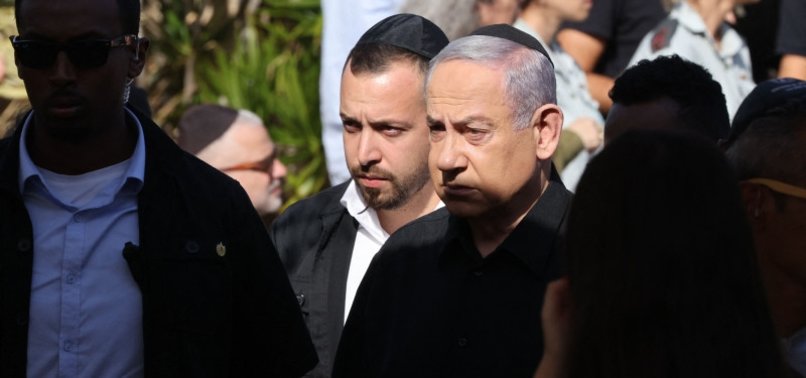
Israel will press on with its "just war to eliminate" Hamas fighters in the Gaza Strip, Prime Minister Benjamin Netanyahu said Saturday as he praised the United States for blocking a UN ceasefire bid.
"I very much appreciate the correct stance the US took at the United Nations Security Council... Therefore, Israel will continue our just war to eliminate Hamas and achieve the rest of the war's goals," Netanyahu said in a video statement.
Benjamin Netanyahu Israel PM
Benjamin Netanyahu: Israeli war on Gaza ‘far from over’
During a gathering with members of his right-wing Likud Party on Monday, Israeli Prime Minister Benjamin Netanyahu declared that the ongoing conflict in the Gaza Strip was not yet resolved. He emphasized that the fighting would persist, stating "We are not halting our efforts."
Anadolu Agency WORLD
Published December 25,2023

Israeli Prime Minister Benjamin Netanyahu said Monday that the war on the Gaza Strip "was far from over."
"We are not stopping. We are continuing to fight," Netanyahu said during a meeting with lawmakers from his right-wing Likud Party.
"We will be intensifying the fighting in the coming days, and the fighting will take long and it is not close to concluding," he added.
The Israeli premier argued that military pressure will succeed in freeing hostages held by Hamas in the Gaza Strip.
"We wouldn't have succeeded up until now to release more than 100 hostages without military pressure," Netanyahu said during a special parliamentary session attended by families of hostages.
"We need time," added Netanyahu, who was interrupted several times by the relatives of the hostages who urged him to work "now" for their release.
According to Israeli media, there are nearly 130 hostages held by Palestinian groups in the Gaza Strip.
Israel has pounded the Gaza Strip since a cross-border attack by the Palestinian group Hamas on Oct. 7, killing at least 20,674 Palestinians, mostly women and children, and injuring 54,536 others, according to local health authorities.
Around 1,200 Israelis are believed to have been killed in the Hamas attack.
The Israeli onslaught has left Gaza in ruins, with half of the coastal territory's housing damaged or destroyed and nearly 2 million people displaced within the densely populated enclave amid shortages of food and clean water.

Doctors accuse Israel of stealing organs from bodies in Gaza

Biden: Israel "starting to lose support" over indiscriminate bombing of Gaza
Biden: Israel "starting to lose support" over indiscriminate bombing of Gaza
In a campaign fundraising event in Washington, U.S. President Joe Biden expressed concern over Israel's actions in Gaza, stating that the country is losing international support due to its indiscriminate bombing, resulting in the deaths of numerous Palestinian civilians. Biden emphasized the need for Israeli Prime Minister Benjamin Netanyahu to alter the approach of his hardline government.
Agencies and A News
Published December 12,2023
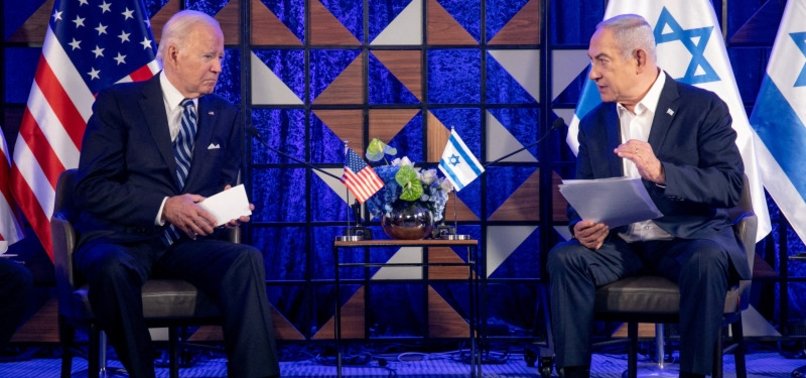
U.S. President Joe Biden said on Tuesday that Israel is starting to lose support from the international community with its indiscriminate bombing of Gaza that has killed thousands of Palestinian civilians.
"They're starting to lose that support," Biden told a campaign fundraising event in Washington. Biden also said Israeli Prime Minister Benjamin Netanyahu needs to change his hardline government.
Biden added that the Israeli government was opposed to a two-state solution with the Palestinians and urged Prime Minister Benjamin Netanyahu to "change" the administration.
"This is the most conservative government in Israel's history," Biden told a campaign event, adding that the government "doesn't want a two-state solution," the path Washington has called for after the war with Hamas.
Benjamin Netanyahu Israel PM
Israel's military chief Herzi Halevi: Gaza conflict will go on for months
Israel's military chief Herzi Halevi: Gaza conflict will go on for months
Herzi Halevi, the military chief of Israel, stressed in his comments on Wednesday that their conflict with Hamas in Gaza is expected to continue for an extended period of time.
Reuters WORLD
Published December 27,2023

Israel's war on Hamas in Gaza will likely go on for many months, the country's military chief Herzi Halevi said on Tuesday.
"There are no shortcuts in dismantling a terrorist organization," Halevi told reporters in a televised statement on the Gaza border. "We will reach Hamas' leadership," he added.




Biden: Israel "starting to lose support" over indiscriminate bombing of Gaza
Biden: Israel "starting to lose support" over indiscriminate bombing of Gaza
In a campaign fundraising event in Washington, U.S. President Joe Biden expressed concern over Israel's actions in Gaza, stating that the country is losing international support due to its indiscriminate bombing, resulting in the deaths of numerous Palestinian civilians. Biden emphasized the need for Israeli Prime Minister Benjamin Netanyahu to alter the approach of his hardline government.
Agencies and A News
Published December 12,2023

U.S. President Joe Biden said on Tuesday that Israel is starting to lose support from the international community with its indiscriminate bombing of Gaza that has killed thousands of Palestinian civilians.
"They're starting to lose that support," Biden told a campaign fundraising event in Washington. Biden also said Israeli Prime Minister Benjamin Netanyahu needs to change his hardline government.
Biden added that the Israeli government was opposed to a two-state solution with the Palestinians and urged Prime Minister Benjamin Netanyahu to "change" the administration.
"This is the most conservative government in Israel's history," Biden told a campaign event, adding that the government "doesn't want a two-state solution," the path Washington has called for after the war with Hamas.
Benjamin Netanyahu
Corruption trial of Israel PM Netanyahu to resume in February
Corruption trial of Israel PM Netanyahu to resume in February
According to The Jerusalem Post, Israel's High Court of Justice has announced that the trial of Prime Minister Benjamin Netanyahu will continue in February. This comes as he faces charges of bribery, fraud, and breach of trust.
Anadolu Agency WORLDPublished December 25,2023

The trial of Israeli Prime Minister Benjamin Netanyahu is expected to resume in February, according to Israel's top court on Monday.
"Netanyahu's trial on charges of bribery, fraud, and breach of trust will resume starting February," the High Court of Justice said in a statement cited by The Jerusalem Post.
The trial was scheduled to resume in October, but was halted following a cross-border attack by Hamas on Oct. 7 with Israel launching a retaliatory military offensive on the Gaza Strip that killed at least 20,674 Palestinians, mostly women and children, and injured 54,536 others, according to local health authorities.
Netanyahu's trial resumed in December by the court acceded to a defense request that hearings be held only twice a week, citing the premier's lack of availability to prepare for the testimonies of new key witnesses amid the Gaza war.
Netanyahu faces charges of bribery, fraud, and breach of trust in one case, and charges of fraud and breach of trust in two other cases. He denies wrongdoing.
The first session of Netanyahu's corruption trial was held on May 24, 2020.
Contact Us
Contact Us
Contact Us
Ready to take your business to the next level? Get in touch with us today and let's talk about how we can help you achieve your goals.
Copyright © 2024 USA Weekly News - All Rights Reserved.
This website uses cookies.
We use cookies to analyze website traffic and optimize your website experience. By accepting our use of cookies, your data will be aggregated with all other user data.

